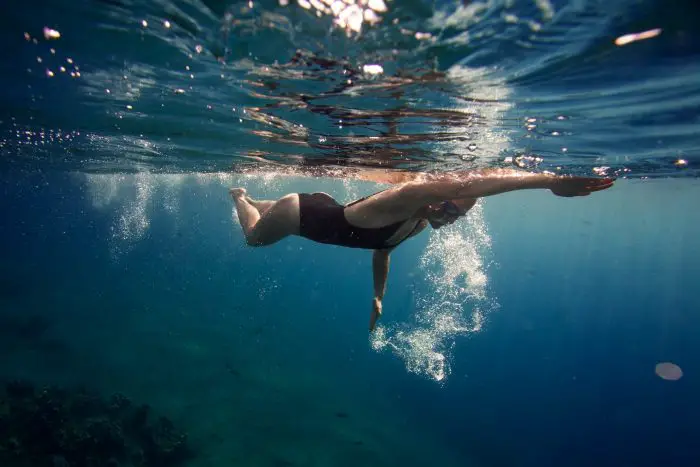If you have ever been to a public pool or the beach as a child, you are probably aware of the inconvenience of not bringing any goggles and having to swim with your eyes closed. Though, for the most part, this doesn’t ruin your swimming experience, it can be not very pleasant when you’re trying to interact with other swimmers and play games which require you to be able to see.
You may have also experienced someone telling you to open your eyes, which seemed like an almost impossible task as a child. As you have got older, your trips to the pool have probably become less frequent, and so you haven’t felt the need to attempt mastering the art of learning how to open your eyes when underwater, aside from the odd time that you’ve heard a mysterious noise in your house while you’re trying to shower.
Something that is undoubtedly on everyone’s bucket list is hitting the water and trying out a water sport such as diving or snorkeling. For that, you are usually provided with giant goggles, meaning that you won’t ever need to face your fear of opening your eyes underwater. Due to so many people just never doing it, you may wonder if you can open your eyes underwater at all and especially in Saltwater.
Can you open your eyes in the Ocean?

Obviously, if we are discussing Saltwater, we need to talk about the most significant body of Saltwater that there is- the Ocean. In films about aquatic explorers and deep-sea divers, it’s rare that you will see anyone enter the water without some protective eye gear, but does this mean that opening your eyes in Saltwater is impossible?
In short, yes, you can open your water in Saltwater. You will feel some initial stinging when you first open your eyes. Still, it is perfectly harmless to do as the Saltwater is really not too dissimilar to the Saltwater that is already present in our eyes. However, you have to make sure that the water is clean water, as attempting to open your eyes in polluted and murky waters can be highly damaging to your eyes as a whole. Suppose you aren’t sure how to differentiate between dirty and clear Saltwater. In that case, you can usually tell by examining the contents that you can see in the water or floating above the water. Every Beginners’ guide to snorkeling lays out some telltale signs that the water you are swimming in is not clean. For example, if the color seems off and murky, you may be close to a sewage line. You should also avoid opening your eyes if you see some unnatural debris. This basically means that if you see driftwood, then you are fine, but if you see a collection of rusty cans floating around you, you probably won’t want to open your eyes- or swim in that water at all, for that matter.
How do you open your eyes in Saltwater?
Though you now know that you can now safely open your eyes in Saltwater, that doesn’t necessarily make doing so any easier. As previously stated, when you first open your eyes when underwater, you are bound to experience some stinging. It is a natural human instinct to stop any action that may be causing you pain quickly, so naturally, when you first open your eyes when underwater, you will want to close your eyes quickly. After experiencing the initial discomfort, most people keep their eyes closed which is understandable. However, if you really want to be able to open your eyes in Saltwater, then you will have to persist and fight against your own natural instincts to close your eyes.
A lot of people worry that the stinging in their eyes, when they open their eyes underwater, is a sign that you shouldn’t do it. However, the human body is made of solid stuff, and after a couple of minutes of discomfort, your eyes will quickly adjust and acclimate to your surroundings.
If you think this seems impossible, you should look into an Amazonian village that fishes without scuba gear. Instead, some of the tribesmen will plunge into the water with a net and collect fish themselves. They do this without any protective eye gear. Instead, they use lights such as dive lights for lobster diving to guide them and then do everything else manually.
Can you see clearly Underwater?

Unfortunately, though you can see in Saltwater, the images you will see will be much more blurry than what you can see with protective eyewear. There is a simple scientific reason for this: to be able to see things clearly. Your eyes need to be able to refract light rays. To do this, the light needs to pass through both air and liquid. When you are wearing goggles, you basically have a pocket of air that allows air to pass through it, which means you can see clearly. However, if you are not using goggles, then there is just water between yourself and the light rays, meaning that you will get blurry images.
This is one of the main reasons that when you snorkel or dive, you do use goggles, as the entire purpose of activities like that is to be able to see the sea life. However, if you are swimming without goggles, this really won’t be that much of an issue.
How to protect your eyes from Saltwater
Don’t wear contact lenses.
If you are someone that requires contact lenses to be able to see clearly, there really is no need to wear lenses when swimming in saltwater as you will not be able to see clearly anyway. Not only this, but Saltwater can cause the shape of your contacts to deform, which can be very detrimental to your eyesight. Your eyes naturally clean themselves, so when you swim and come into any contact with bacteria and microorganisms, your eye naturally flushes them out. However, if you are wearing contact lenses, the bacteria can latch on, which may lead to future infection.
Use a saline solution.
As previously stated, when you first attempt to open your eyes underwater, you are bound to experience some stinging. Though this is completely harmless, it can be irritating, and if you have your eyes opened for an extended period of time, your eyes can feel sore and tender. If you use a saline solution on your eyes when you are finished swimming, it will soothe your eyes and prevent any future pain.
